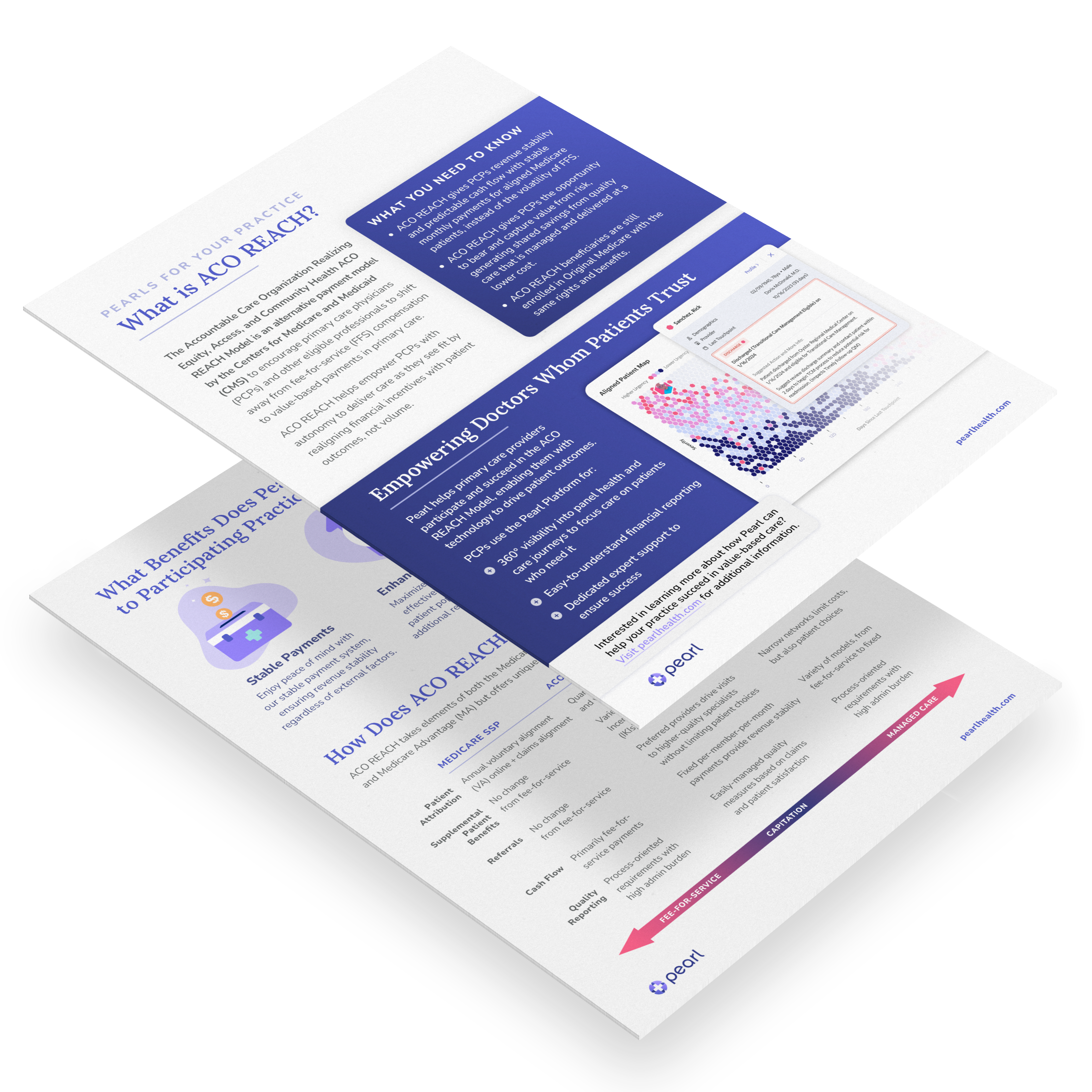Out with the old and in with the new!
The Medicare Shared Savings Program1 (MSSP) is America’s largest national value-based care program. Established by legislation in 2012, MSSP was primarily created to curb our country’s soaring Medicare costs by rewarding specific disease outcomes. Covering nearly 11 million Americans each year, MSSP saved the government an estimated $1.8 billion2 in 2022 — but while MSSP has saved taxpayers billions of dollars, the increased burden for PCPs and small practices has become dangerously expensive and time-consuming.
Since the inception of MSSP, CMS has required providers to submit quality data information to the Centers for Medicare and Medicaid Services (CMS). These measures were created to assess patient care quality, informing whether an ACO is eligible to keep a portion of financial savings or pay any financial losses.
Requirements for quality submission vary depending on the MSSP Track in which a provider is enrolled. In lower-risk tracks (BASIC Levels A through D), providers are required to submit Traditional MIPS3 or the newer MIPS Medicare Value Pathways (MVP).4 In higher-risk tracks (BASIC Level E and Enhanced), the ACO is required to submit ACO-level quality information to CMS. In all Tracks, clinical quality measures are necessary, which means ACOs must pull this data from each provider’s Electronic Health Record (EHR). This remains an onerous and costly task for ACOs, and its providers and their office staff, who are already over-worked and struggling to meet the demand of their patients.
One of the newer value-based models from the Centers for Medicare and Medicaid Innovation (CMMI) — ACO REACH5 — adopts a radically logical and different approach to quality measurement. While of course reporting on quality measures is still mandatory, three of the four measures are claims-based and automatically calculated (and submitted) by CMS. The fourth measure is a patient experience survey (CAHPS) disseminated by the ACO and a CMS-approved vendor to patients. In the REACH model, there is no burden on the PCP or their practice to extract information from their EHR and therefore, providers are freed from this reporting burden, which can cost nearly $13,000 and 100 hours per physician per year.6
Quality Measures in MSSP vs. ACO REACH
Note: Take a look at Pearl’s more in-depth blog on quality measurement in ACO REACH.
In December 2023, a group of bipartisan senators introduced the Value in Health Care Act7 to facilitate Medicare’s continued shift to value-based care. Several changes were proposed to MSSP, though the MIPS quality reporting requirements remained untouched. What was welcomed was the addition of a 100% full-risk track, which is comparable to the Global Track in ACO REACH. Since the current MSSP Enhanced track allows for risk-sharing up to 75%, this new track would allow for full-risk arrangements up to 100% for sophisticated providers interested in taking more risk beyond 75%. That said, the proposed legislation remains beguiled by the problematic MIPS reporting requirements.
Today, many providers still remain on the sidelines of value-based care, as they are understandably reluctant to report specific EHR-extracted quality process measures. As CMS continues to evolve MSSP, we strongly recommend an increased focus on claims-based outcome measures as they offer a verifiable downstream marker of superior long-term care and afford providers more time to focus on patient care. Only then will high-quality care be truly realized, while protecting our frontline caretakers from the burnout stemming from non-value-added administrative tasks.

FREE GUIDE
Pearl's Guide to Medicare's ACO REACH Model
Cut through the clutter with a quick overview about the ACO REACH Model. Discover how Pearl Health is positioned to support your practice with a broader vision for building an ecosystem that enables value-based success.
- For more information, see the Centers for Medicare & Medicaid Services
- From CMS’ Newsroom
- See CMS’ Quality Payment Program Traditional MIPS Overview
- See CMS’ Quality Payment Program MIPS Value Pathways. Introduced for Performance Year 2023, MIPs MVP are a series of quality measures dependent on specialist type and/or medical condition.
- For more, see CMS’ Model Overview of ACO REACH
- Khullar D, Bond AM, O’Donnell EM, Qian Y, Gans DN, Casalino LP. Time and Financial Costs for Physician Practices to Participate in the Medicare Merit-based Incentive Payment System: A Qualitative Study. JAMA Health Forum. 2021;2(5):e210527. doi:10.1001/jamahealthforum.2021.052
- Whitehouse, Barrasso, Welch, Tillis, colleagues introduce bipartisan legislation to incentivize better health care at lower costs



